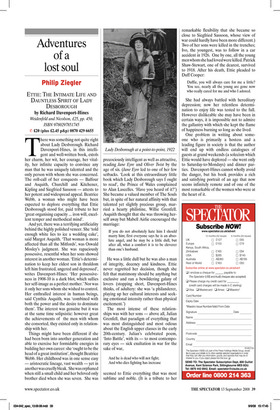Adventures of a lost soul
Philip Ziegler
ETTIE: THE INTIMATE LIFE AND DAUNTLESS SPIRIT OF LADY DESBOROUGH by Richard Davenport-Hines Weidenfeld and Nicolson, £25, pp. 450, ISBN 9780297851745 ✆ £20 (plus £2.45 p&p) 0870 429 6655 There was something not quite right about Lady Desborough. Richard Davenport-Hines, in this intelligent and well-written book, extols her charm, her wit, her courage, her vitality, her infinite capacity to convince any man that he was uniquely talented and the only person with whom she was concerned. The roll-call of her conquests — Balfour and Asquith, Churchill and Kitchener, Kipling and Siegfried Sassoon — attests to her potent and widespread appeal. Beatrice Webb, a woman who might have been expected to deplore everything that Ettie Desborough stood for, paid tribute to her ‘great organising capacity ... iron will, excellent temper and methodical mind’.
And yet, there was a terrifying artificiality behind the highly polished veneer. She ‘told enough white lies to ice a wedding cake’, said Margot Asquith. ‘That woman is more affected than all the Mitfords’, was Oswald Mosley’s judgment. She was rapaciously possessive, resentful when her sons showed interest in another woman. ‘Ettie’s determination to keep her eldest son in thraldom left him frustrated, angered and depressed’, writes Davenport-Hines: ‘Her possessiveness in 1908-10 is a dark blot, which sullies her self-image as a perfect mother.’ Nor was it only her sons whom she wished to control. Her enthralled interest in human beings, said Cynthia Asquith, was ‘combined with both the power and the desire to dominate them’. The interest was genuine but it was at the same time solipsistic: however great the achievements of the men with whom she consorted, they existed only in relationship with her.
Things might have been different if she had been born into another generation and able to exercise her formidable energies in building her own career: she ‘ought to be the head of a great institution’, thought Beatrice Webb. Her childhood was in one sense easy — aristocratic lineage, vast wealth — yet in another was cruelly bleak. She was orphaned when still a small child and her beloved only brother died when she was seven. She was precociously intelligent as well as attractive, reading Jane Eyre and Oliver Twist by the age of six. (Jane Eyre led to one of her few setbacks. ‘Look at this extraordinary little book which Lady Desborough says I ought to read’, the Prince of Wales complained to Alan Lascelles. ‘Have you heard of it?’) She became a valued member of The Souls but, in spite of her natural affinity with that talented yet slightly precious group, married a hearty philistine, Willie Grenfell. Asquith thought that she was throwing herself away but Mabell Airlie encouraged the marriage:
If you do not absolutely hate him I should marry him; first everyone says he is an absolute angel, and he may be a little dull, but after all, what a comfort it is to be cleverer than one’s husband.
He was a little dull but he was also a man of integrity, decency and kindness. Ettie never regretted her decision, though she felt that matrimony should be anything but exclusive and ran a bewildering galaxy of lovers (stopping short, Davenport-Hines thinks, of adultery: she was ‘a philanderer, playing up her cultural interests and seeking emotional intensity rather than physical excitement.’) The most intense of these relationships was with her sons — above all, Julian Grenfell, that paradigm of everything that was most distinguished and most odious about the English upper classes in the early 20th-century. Julian’s celebrated poem, ‘Into Battle’, with its — to most contemporary eyes — sick exultation in war for the sake of war, seemed to Ettie everything that was most sublime and noble. (It is a tribute to her remarkable flexibility that she became so close to Siegfried Sassoon, whose view of war could hardly have been more different.) Two of her sons were killed in the trenches; Ivo, the youngest, was to follow in a car accident in 1926. One by one, all the young men whom she had loved were killed. Patrick Shaw-Stewart, one of the dearest, survived to 1918. After his death, Ettie pleaded to Duff Cooper:
Duffie, you will always care for me a little? You see, nearly all the young are gone now who really cared for me and who I adored.
She had always battled with hereditary depression; now her relentless determination to enjoy life was tested to the full. However dislikeable she may have been in certain ways, it is impossible not to admire the gallantry with which she kept the flame of happiness burning so long as she lived.
One problem in writing about someone who is primarily a hostess and a leading figure in society is that the author will end up with endless catalogues of guests at grand weekends (a solecism which Ettie would have deplored — she went only to Saturday-to-Mondays) and dinner parties. Davenport-Hines cannot wholly avoid the danger, but his book provides a rich and satisfying portrait of an age that now seems infinitely remote and of one of the most remarkable of the women who were at the heart of it.










































































 Previous page
Previous page